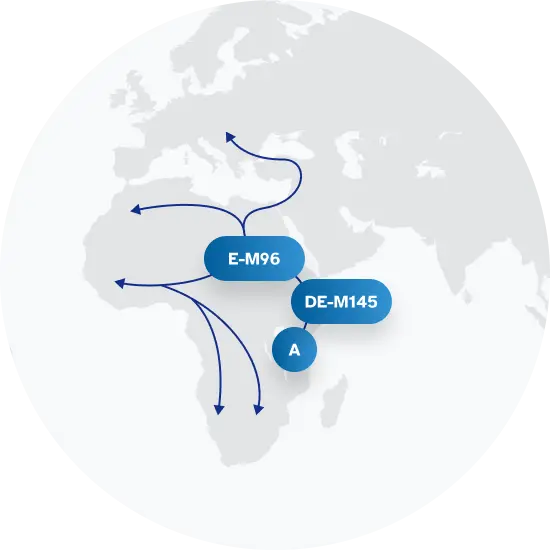Explore the Family Name Branham
The meaning of Branham
Irish: from Mac Branáin, see Brannan, which is itself a variant of Brennan.
Dictionary of American Family Names, 2nd edition, © Oxford University Press, 2022.
How common is the last name Branham in the United States?
Based on the Decennial U.S. Census data, the popularity of the surname Branham saw a minor decline between 2000 and 2010. The rank of the surname went from 2446 to 2599, marking a decrease of approximately 6.26%. However, the count of individuals carrying the surname witnessed a marginal increase of 2.38%, moving from 13,550 in 2000 to 13,872 in 2010. The proportion per 100k also decreased by 6.37%.
| 2000 | 2010 | Change | |
|---|---|---|---|
| Rank | #2,446 | #2,599 | -6.26% |
| Count | 13,550 | 13,872 | 2.38% |
| Proportion per 100k | 5.02 | 4.7 | -6.37% |
Race and Ethnicity of people with the last name Branham
In terms of ethnic identity, the Decennial U.S. Census data reveals several shifts among those with the surname Branham from 2000 to 2010. The percentage of individuals identifying as Asian/Pacific Islander increased by 33.33%, while those reporting two or more races saw an increase of 47.79%. The percentage of white individuals declined slightly by 2.34%, whereas the Hispanic population rose by 46.46%. Those identifying as Black saw a rise of 9.63%, and the percentage of American Indian and Alaskan Native individuals increased by 9.93%.
| 2000 | 2010 | Change | |
|---|---|---|---|
| White | 88.54% | 86.47% | -2.34% |
| Black | 7.37% | 8.08% | 9.63% |
| Two or More Races | 1.36% | 2.01% | 47.79% |
| American Indian and Alaskan Native | 1.41% | 1.55% | 9.93% |
| Hispanic | 0.99% | 1.45% | 46.46% |
| Asian/Pacific Islander | 0.33% | 0.44% | 33.33% |
Branham ancestry composition
23andMe computes an ancestry breakdown for each customer. People may have ancestry from just one population or they may have ancestry from several populations. The most commonly-observed ancestry found in people with the surname Branham is British & Irish, which comprises 62.7% of all ancestry found in people with the surname. The next two most common ancestries are French & German (20.6%) and Eastern European (2.7%). Additional ancestries include Scandinavian, Italian, Spanish & Portuguese, Nigerian, and Indigenous American.
Ready to learn more about your ancestry? Get the most comprehensive ancestry breakdown on the market by taking our DNA test. Shop 23andMe
| ANCESTRY BREAKDOWN | COMPOSITION |
|---|---|
| British & Irish | 62.7% |
| French & German | 20.6% |
| Eastern European | 2.7% |
| Other | 13.9% |

Possible origins of the surname Branham
Your DNA provides clues about where your recent ancestors may have lived. Having many distant relatives in the same location suggests that you may all share common ancestry there. Locations with many distant relatives can also be places where people have migrated recently, such as large cities. If a large number of individuals who share your surname have distant relatives in a specific area, it could indicate a connection between your surname and that location, stemming from either recent ancestral ties or migration.
Based on 23andMe data, people with last name Branham have recent ancestry locations in the United Kingdom of Great Britain and Northern Ireland and Ireland.
| RECENT ANCESTRY Location | Percentage |
|---|---|
| Merseyside, United Kingdom | 94.00% |
| Greater London, United Kingdom | 94.00% |
| Glasgow City, United Kingdom | 93.60% |
| Greater Manchester, United Kingdom | 93.60% |
| West Midlands, United Kingdom | 93.60% |
What Branham haplogroups can tell you
Haplogroups are genetic population groups that share a common ancestor on either your paternal or maternal line. These paternal and maternal haplogroups shed light on your genetic ancestry and help tell the story of your family.
The top paternal haplogroup of people with the surname Branham is E-P252, which is predominantly found among people with Sub-Saharan African ancestry. Haplogroup E-P252 is descended from haplogroup E-M96. Other common haplogroups include R-CTS241 and R-P311, which are predominantly found among people with European and European ancestry. Other surnames with similar common haplogroups are: Sweat, Hollis, Gooden, Goins, Warrick, Tolliver, Mccray, Pierre, Bey, Hollins.
The most common maternal haplogroups of people with Branham surname are: H1, T2b, H. These most commonly trace back to individuals of European ancestry.
 Paternal Haplogroup Origins E-M96
Paternal Haplogroup Origins E-M96
Your paternal lineage may be linked to Ramesses III
Pharaoh Ramesses III defended Egypt in three consecutive wars during his approximately 30-year reign, but provoked dissent within his administration. Catalyzed by mounting internal strife, one of Ramesses's lesser wives, Tiye, hatched a plot to have her son, Pentawer, usurp the throne by having Ramesses III murdered along with his appointed heir. A papyrus record of the resulting trial explains that the plot failed and that all involved were tried and convicted.However, a modern CT scan of Ramesses III's mummy revealed a deep slit in his throat, reopening a case long thought closed. The embalmers went to great lengths to cover up other wounds, including fashioning a fake toe out of resin where Ramesses's real one had been hacked off, likely during a fatal attack. For thousands of years, Ramesses's burial adornments concealed the wounds that mark one of the most famous royal dramas in history. Ramesses III's paternal lineage belongs to haplogroup E-V38.
Your maternal lineage may be linked to Marie Antoinette
Because it is so dominant in the general European population, haplogroup H also appears quite frequently in the continent's royal houses. Marie Antoinette, an Austrian Hapsburg who married into the French royal family, inherited the haplogroup from her maternal ancestors. So did Prince Philip, Duke of Edinburgh, whose recorded genealogy traces his female line to Bavaria. Scientists also discovered that famed 16th century astronomer Nicolaus Copernicus traced his maternal lineages to haplogroup H.

What do people with the surname Branham have in common?
Spoiler alert: it's complicated. People with the same last name are usually no more genetically similar than a randomly sampled group of people from the same population. That said, people with the same surname are more likely to have similar ancestries than randomly sampled individuals. The reason is the tendency of people with similar cultural or geographical backgrounds to preferentially mate with one another. That's why people who share a surname may be more likely to share traits and tendencies in common than people within the general population. Check out the percentages below to see the prevalences of tastes, habits, and traits of people with your surname compared with prevalences among 23andMe users.
Preferences
Traits
Habits
Wellness
Are health conditions linked to the last name Branham?
The short answer is that, if there is an association between surname and health, it's usually more about your ancestry than your name. Individuals with a given surname are no more genetically similar than the general population but often have similar ancestries. The populations of people associated with those shared ancestries often have sets of genetic variations, also known as alleles, in common. Some of those alleles are associated with a greater likelihood of developing certain diseases.
Disease variant frequency by ancestry
Disease allele frequencies in populations associated with the surname Branham are shown below. Important Note: not everyone with a disease allele will develop these health condition






















